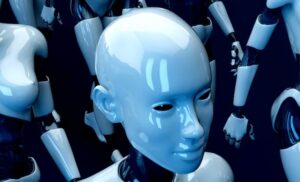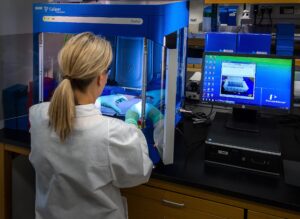
In the digital era, the rise of Artificial Intelligence (AI) has been one of the most transformative and revolutionary developments across industries. AI is a branch of computer science that aims to create intelligent machines capable of performing tasks that typically require human intelligence. From automating repetitive processes to enabling data-driven decision-making, AI has become a powerful tool with the potential to reshape industries and redefine the way we live and work.
- AI in Healthcare: Revolutionizing Patient Care
The healthcare industry has witnessed a paradigm shift with the integration of AI technologies. AI-driven applications, such as medical image analysis, have improved diagnostic accuracy and speed, enabling early detection of diseases. Additionally, AI-powered chatbots and virtual assistants facilitate 24/7 patient engagement and support, reducing the burden on healthcare professionals.
In drug discovery and development, AI algorithms analyze vast datasets and identify potential drug candidates, significantly accelerating the research process. Moreover, AI-driven wearable devices and remote monitoring systems have empowered patients to take charge of their health, leading to more personalized and preventive care.
- AI in Finance: Enhancing Efficiency and Risk Management
In the financial sector, AI has disrupted traditional processes, making them faster, more efficient, and accurate. AI-powered algorithms analyze vast amounts of financial data in real-time, enabling faster and more informed investment decisions. Moreover, AI has revolutionized fraud detection, flagging suspicious transactions and protecting customers from financial crimes.
The application of AI in credit assessment has facilitated more inclusive lending practices by considering alternative data sources, such as social media and transaction history. Furthermore, AI-driven chatbots and virtual assistants have enhanced customer service, providing instant support and personalized recommendations.
- AI in Manufacturing: Driving Automation and Predictive Maintenance
The manufacturing industry has undergone a significant transformation with the integration of AI-driven automation. AI-powered robots and cobots (collaborative robots) have streamlined production lines, resulting in increased productivity and reduced human errors. Machine learning algorithms optimize production schedules, inventory management, and supply chain logistics, minimizing waste and cost.
Predictive maintenance, a critical aspect of manufacturing, leverages AI to anticipate equipment failures and schedule maintenance proactively. This approach ensures optimal uptime, minimizes downtime, and reduces maintenance costs. Overall, AI-driven solutions have turned traditional factories into smart and agile production centers.
- AI in Transportation: Paving the Way for Autonomous Vehicles
AI has become the backbone of the transportation industry, especially in the development of autonomous vehicles. Self-driving cars leverage AI algorithms and sensor technologies, such as LiDAR and cameras, to navigate safely and efficiently on roads. The potential benefits of autonomous vehicles include improved road safety, reduced traffic congestion, and increased accessibility for people with mobility challenges.
Beyond autonomous vehicles, AI optimizes traffic flow in smart cities, predicting and managing congestion based on real-time data. Additionally, AI-powered route planning and ride-sharing services enhance transportation efficiency and reduce carbon emissions.
- AI in Customer Service: Delivering Personalization and Efficiency
In the realm of customer service, AI has revolutionized the way businesses interact with their customers. AI-powered chatbots and virtual assistants handle customer inquiries and resolve issues promptly, providing round-the-clock support without the need for human intervention. Natural Language Processing (NLP) enables these AI systems to understand and respond to customer queries with increasing accuracy.
Moreover, AI-driven personalization has become a key aspect of customer engagement. E-commerce platforms leverage AI algorithms to recommend products based on customer preferences and browsing history, leading to a more personalized shopping experience. AI also helps businesses anticipate customer needs, allowing them to offer timely and relevant solutions.

Conclusion
Artificial Intelligence has proven to be a transformative force across industries, unlocking new possibilities and optimizing existing processes. From healthcare and finance to manufacturing, transportation, and customer service, AI has left an indelible mark on how businesses operate and serve their customers.
As AI technology continues to evolve, it is vital for businesses and policymakers to address potential challenges, such as data privacy, ethical concerns, and workforce displacement. By harnessing AI responsibly and ethically, industries can leverage its potential to drive innovation, enhance efficiency, and create a more sustainable and connected future. Embracing AI as a powerful ally rather than a replacement, industries can harness the full potential of this groundbreaking technology for the betterment of society.
Here are a few key points to consider when exploring the impact of AI across industries:
- Data Accessibility and Quality: The success of AI applications heavily relies on the availability and quality of data. Industries must ensure they have access to relevant and accurate data to train AI algorithms effectively. Data privacy and security concerns also need to be addressed to maintain trust among consumers and stakeholders.
- Ethical and Bias Concerns: AI algorithms can inadvertently perpetuate biases present in the data they are trained on. Industries must be mindful of these biases and take steps to ensure fairness, transparency, and ethical use of AI technologies.
- Regulatory Landscape: As AI applications become more widespread, regulatory frameworks need to evolve to address potential risks and ensure responsible use. Industries must navigate these regulations to deploy AI solutions in compliance with the law.
- Workforce Impact: AI has the potential to automate certain tasks, leading to concerns about job displacement. Industries should focus on upskilling and reskilling their workforce to adapt to AI-driven changes and find new opportunities for human-AI collaboration.
- Integration with Existing Systems: Incorporating AI technologies into existing infrastructures may present challenges. Compatibility issues and seamless integration are crucial considerations to ensure the successful implementation of AI solutions.
- Reliability and Accountability: As AI-driven systems become more autonomous, it is essential to establish accountability mechanisms to address potential failures or errors. Trust in AI technologies will depend on their reliability and the ability to rectify mistakes promptly.
- AI Explainability: In critical applications such as healthcare and finance, the ability to explain AI decisions is crucial. Industries must develop AI models that can provide transparent explanations for their outputs to gain user trust.
- Collaboration and Interdisciplinary Approach: Addressing complex challenges related to AI requires collaboration between technologists, policymakers, ethicists, and domain experts. An interdisciplinary approach can lead to comprehensive and well-rounded solutions.
- AI for Social Good: While the focus is often on commercial applications, industries should explore how AI can be used for social good, such as addressing climate change, healthcare disparities, and humanitarian aid.
- Continuous Innovation and Adaptation: The AI landscape evolves rapidly. Industries must stay updated on the latest advancements and be prepared to adapt their strategies and operations accordingly.
By taking these points into account, industries can maximize the positive impact of AI, mitigate potential risks, and embrace AI technologies responsibly as they redefine the future of various sectors






